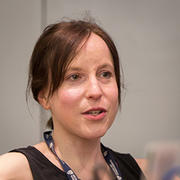
Writing involves mistakes (lots of them), perseverance when facing inevitable rejection, practice, and one more thing—courage, because chances are, it will probably be difficult more often than it is easy.This is known all too well by Lisa Rosenbaum, MD, cardiologist at Brigham and Women’s Hospital and national correspondent for the New England Journal of Medicine. Rosenbaum , spoke candidly to students enrolled in the academic writing seminar, Expos 20: What is Health and How Do We Achieve It? taught by Eve Wittenberg, a Senior Scholar in Residence at GHELI. Wittenberg is the preceptor for this introductory writing course, designed for first-year students at Harvard College interested in health. Integrating approaches and concepts familiar to GHELI, the course weaves innovative teaching and learning tools to help students devise arguments and articulate positions.
Rosenbaum exemplifies a professional at the pinnacle of two disciplines: writing and STEM. But her journey to becoming a doctor and writer was anything but conventional. Rosenbaum spoke openly about the difficulties she has faced while writing—the pain of rejection, the self-reflection needed to determine what one can uniquely bring to the field, the fortitude needed to explore the unknown through writing. She emphasized that very early on she had to learn to “develop a thick skin” to be able to face critical feedback, integrate it into her writing, and then use that renewed strength to defend her views. She compared the process to her mother’s pumpkin soup—maybe not perfect at first, but with multiple tries, time, and possibly even several fresh starts, evolving into a satisfying piece. Emphasizing the importance of loving the arduous process of writing, she mused that writers are most often inspired to brilliance from the inherent meaning of the process, not because of the goal of publication.
After Rosenbaum’s talk, students’ hands shot up with questions: Where does one start on the journey to becoming a writer? How do you develop structure in writing? How does one develop voice? Although there is no one answer, students were encouraged to just start, and rewrite, rethink, and rewrite again. The path to becoming a good writer is a becoming, including failures and successes just like any other endeavor, finally culminating in a fruitful result that is no less than a well-seasoned, refined, perfect pumpkin soup.
